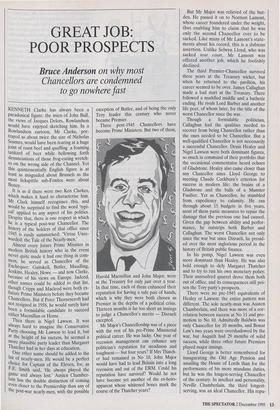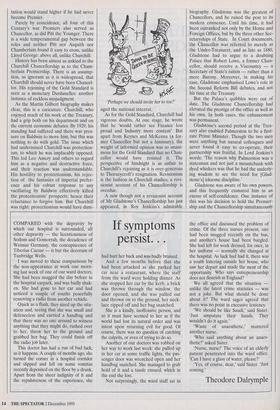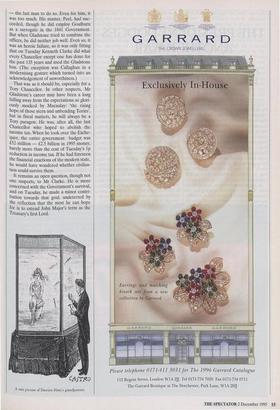GREAT JOB: POOR PROSPECTS
Bruce Anderson on why most
Chancellors are condemned to go nowhere fast
KENNETH Clarke has always been a paradoxical figure: the mien of John Bull, the views of Jacques Delors. Rowlandson would have enjoyed sketching him In a Rowlandson cartoon, Mr Clarke, por- trayed as about twice the size of Nicholas Soames, would have been tearing at a huge joint of roast beef and quaffing a foaming tankard of beer while bellowing forth denunciations of those frog-eating wretch- es on the wrong side of the Channel. Yet this quintessentially English figure is at least as misguided about Brussels as the most lickspittle sub-Foxites were about Boney.
It is as if there were two Ken Clarkes, which makes it hard to characterise him. Mr Clark himself recognises this, and would be surprised to find the word 'typi- cal' applied to any aspect of his politics. Despite that, there is one respect in which he is a typical post-war Chancellor. The history of the holders of that office since 1945 is easily summarised: 'Virtue Unre- warded: the Tale of the Nearly-men.'
Almost every future Prime Minister in modern British history who in the event never quite made it had one thing in com- mon, he served as Chancellor of the Exchequer: Gaitskell, Butler, Maudling, Jenkins, Healey, Howe — and now Clarke, because of his views on Europe. Indeed, other names could be added to that list, though Cripps and Macleod were both ex- future Prime Ministers before they became Chancellors. But if Peter Thorneycroft had not resigned in 1958, he would surely have been a formidable candidate to succeed either Macmillan or Home.
Then there is Nigel Lawson. It was always hard to imagine the Conservative Party choosing Mr Lawson to lead it, but at the height of his success, he seemed a more plausible party leader than Margaret Thatcher had in her days at education. One other name should be added to the list of nearly-men. He would be a perfect choice for Captain of the Eleven, for, as P.E. Smith said, 'He always played the game and always lost.' Austen Chamber- lain has the double distinction of coming even closer to the Premiership than any of the post-war nearly-men, with the possible exception of Butler, and of being the only Tory leader this century who never became Premier.
Three post-1945 Chancellors have become Prime Ministers, But two of them, Harold Macmillan and John Major, were at the Treasury for only just over a year. In that time, each of them enhanced their reputation for having a safe pair of hands, which is why they were both chosen as Premier in the depths of a political crisis. Thirteen months is far too short an innings to judge a Chancellor's merits — Disraeli excepted. Mr Major's Chancellorship was of a piece with the rest of his pre-Prime Ministerial political career. He was lucky. One year of recession management can enhance any politician's reputation for steadiness and toughness — but four years? If Mrs Thatch- er had remained in No 10, John Major would have had to lead Britain into a long recession and out of the ERM. Could his reputation have survived? Would he not have become yet another of the ex-heirs- apparent whose whitened bones mark the course of the Thatcher years? But Mr Major was relieved of the bur- den. He passed it on to Norman Lamont, whose career foundered under the weight, thus enabling him to claim that he was only the second Chancellor ever to be sacked. Like many of Mr Lamont's state- ments about his record, this is a dubious assertion. Unlike Selwyn Lloyd, who was sacked tout court, Mr Lamont was offered another job, which he foolishly declined.
The third Premier-Chancellor survived three years at the Treasury wicket, but when he returned to the pavilion, his career seemed to be over. James Callaghan made a bad start at the Treasury. There followed a muddled middle and a bathetic ending. He rivals Lord Barber and another life peer, of whom later, for the title of the worst Chancellor since the war.
Though a formidable politician, Callaghan had the qualities needed to recover from being Chancellor rather than the ones needed to be Chancellor. But a well-qualified Chancellor is not necessarily a successful Chancellor. Denis Healey and Nigel Lawson were both dominant figures, so much in command of their portfolio that the occasional commentator heard echoes of Gladstone. Healey also came closer than any Chancellor since Lloyd George to meeting Claude Cockburn's criterion for success in modern life: the brains of a Gladstone and the balls of a Munster Fusilier. Yet as Chancellor, he stumbled from expediency to calamity. He ran through about 15 budgets in five years, most of them panic measures to repair the damage that the previous one had caused. Given the gap between ability and perfor- mance, he outstrips both Barber and Callaghan. The worst Chancellor not only since the war but since Disraeli, he presid- ed over the most inglorious period in the history of British public finance.
In his pomp, Nigel Lawson was even more dominant than Healey. He was also bold enough to defy Margaret Thatcher and to try to run his own monetary policy. Their unresolved quarrel drove them both out of office, and its consequences still poi- son the Tory party's prospects.
There were no pre-1945 equivalents of Healey or Lawson: the entire pattern was different. The sole nearly-man was Austen Chamberlain, and there was more of a cor- relation between Success at No 11 and pro- motion to No 10. Admittedly Baldwin was only Chancellor for 10 months, and Bonar Law's two years were overshadowed by the war, but Asquith had 29 months of solid success, while three other future Premiers played major innings.
Lloyd George is better remembered for inaugurating the Old Age Pension and assailing the House of Lords than for the performance of his more mundane duties, but he was the longest-serving Chancellor of the century. In intellect and personality, Neville Chamberlain, the third longest- serving, was an ideal Chancellor. His repu- tation would stand higher if he had never become Premier.
Purely by coincidence, all four of this Century's war Premiers also served as Chancellor, as did Pitt the Younger. There is a wide temperamental gap between the roles and neither Pitt nor Asquith nor Chamberlain found it easy to cross, unlike Lloyd George: above all, unlike Churchill.
History has been almost as unkind to the Churchill Chancellorship as to the Cham- berlain Premiership. There is an assump- tion, as ignorant as it is widespread, that Churchill should never have been Chancel- lor. His rejoining of the Gold Standard is seen as a monetary Dardanelles: another instance of reckless misjudgment.
As the Martin Gilbert biography makes clear, this is a caricature. Churchill, who enjoyed much of his work at the Treasury, had a grip both on his department and on the current economic debates. By 1929, his standing had suffered and there was pres- sure on Baldwin to move him, but this was nothing to do with gold. The issue which had undermined Churchill was protection- ism, to which he was implacably opposed. This led Leo Amery and others to regard him as a negative and destructive force, and their reaction was understandable. His hostility to protectionism, his rejec- tion of the fantasies of imperial prefer- ence and his robust response to any vacillating by Baldwin effectively killed the protectionists' prospects: hence their reluctance to forgive him. But Churchill was right: protectionism would have dam- Perhaps we should invite her to tea?'
aged the national interest.
As for the Gold Standard, Churchill had vigorous doubts. At one stage, he wrote that he 'would rather see Finance less proud and Industry more content'. But apart from Keynes and McKenna (a for- mer Chancellor but not a luminary), the weight of informed opinion was so unani- mous for the Gold Standard that no Chan- cellor would have resisted it. The perspective of hindsight is as unfair to Churchill's rejoining as it is over-generous to Thorneycroft's resignation. Revisionism is the fashion in Churchill studies; a revi- sionist account of his Chancellorship is overdue.
A new though not a revisionist account of Mr Gladstone's Chancellorship has just appeared, in Roy Jenkins's admirable biography. Gladstone was the greatest of Chancellors, and he raised the post to its modern eminence. Until his time, it had been outranked not only by the Home and Foreign Offices, but by the three other Sec- retaryships of State. In Court documents, the Chancellor was referred to merely as the Under-Treasurer, and as late as 1880, Gladstone had to argue to a doubting Palace that Robert Lowe, a former Chan- cellor, should receive a Viscountcy — a Secretary of State's ration — rather than a mere Barony. Moreover, in making his case, Gladstone emphasised Lowe's role in the Second Reform Bill debates, and not his time at the Treasury But the Palace's quibbles were out of date. The Gladstone Chancellorship had elevated the prestige of the office as well as his own. In both cases, the enhancement was permanent.
Gladstone's second period at the Trea- sury also enabled Palmerston to be a first- rate Prime Minister. Though the two men were anything but natural colleagues and never found it easy to co-operate, their partnership was fruitful. In Lord Jenkins's words: 'The reason why Palmerston was a statesman and not just a mountebank with dyed whiskers was that he had the underly- ing wisdom to see the need for [Glad- stone's] irksome discipline.'
Gladstone was aware of his own powers, and this frequently ensnared him in an excess of self-confidence. One instance of this was his decision to hold the Premier- ship and the Chancellorship simultaneously — the last man to do so. Even for him, it was too much. His master, Peel, had suc- ceeded, though he did employ Goulburn as a surrogate in the 1841 Government. But when Gladstone tried to combine the offices, he did neither job well. Even so, it was an heroic failure, so it was only fitting that on Tuesday Kenneth Clarke did what every Chancellor except one has done for the past 135 years and used the Gladstone box. (The exception was Callaghan in a modernising gesture which turned into an acknowledgement of unworthiness.) That was as it should be, especially for a Tory Chancellor. In other respects, Mr Gladstone's career may have been a long falling away from the expectations so glori- ously mocked by Macaulay: 'the rising hope of those stern and unbending Tories', but in fiscal matters, he will always be a Tory paragon. He was, after all, the last Chancellor who hoped to abolish the income tax. When he took over the Exche- quer, the entire government budget was £52 million — £2.5 billion in 1995 money, barely more than the cost of Tuesday's 1p reduction in income tax. If he had foreseen the financial exactions of the modern state, he would have wondered whether civilisa- tion could survive them.
It remains an open question, though not one suspects, to Mr Clarke. He is more concerned with the Government's survival, and on Tuesday, he made a minor contri- bution towards that goal, undeterred by the reflection that the most he can hope for is to extend John Major's term as the Treasury's first Lord.
A rare picture of Damien Hirst's grandparents












































































 Previous page
Previous page